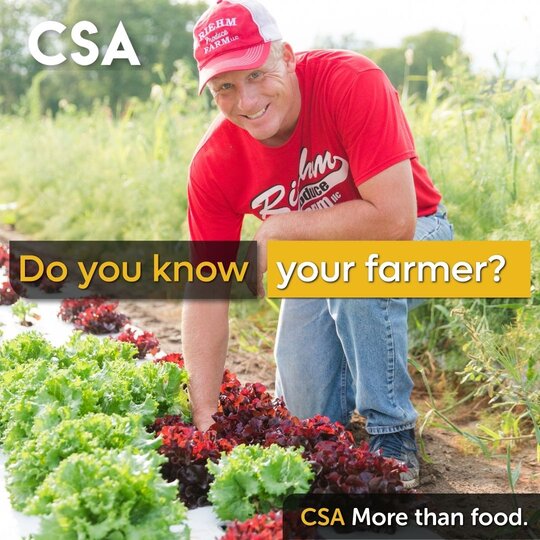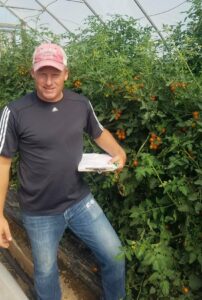
“I firmly believe that healthy soil equals healthy crops, which equals a healthier you.”
Healthy soil make healthy crops which makes a healthier you!
Top quality, superior flavor and maximum health!
Those are the standards Riehm Produce Farm uses to ensure the best vegetables are ready each week for your CSA Market Boxes.
Lead grower Phil Riehm draws on 20+ years of experience to manage crops in advance.
He uses efficient, sustainable growing practices to ensure the best-tasting, most nutritious vegetables will grace the CSA Market Boxes of customers each week, no matter the season.
Vegetables grown by the methods used at Riehm Produce Farm provide a higher nutritional value which equates to more flavor.
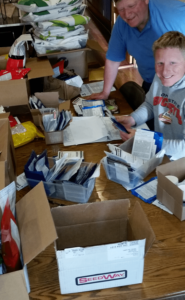
Phil and John browsing through seed catalogs for their best options.
“I come from my previous line of work where I was managing fields of a farm that sold to five-star restaurants all over the world,” Phil said. “I learned outside-the-box thinking so I’m always trying new varieties. Some work, some don’t.”
When Phil and his father, John, look at seed catalogs, they are looking first for flavors they would enjoy eating and for vegetables that offer visual appeal. That’s different from the nations average farmer who is more interested in high yields than flavor and nutrition.
Next, Phil and John look at disease-resistant characteristics that aim for the most efficient production. Then, harvest characteristics such as “will this particular variety allow us to extend the season?” (Will this variety hold up in the heat or cold).
Sustainable vs. organic:
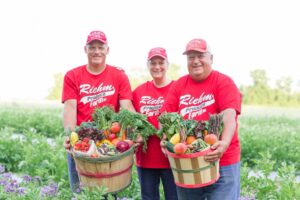
Although not certified organic, the farm has been certified in the past and the Riehm family continues to follow organic practices.
Diane Riehm said she often gets questions related to sustainable and organic growing practices from prospective customers.
“We’re not certified, but organic practices are followed,” she said.
“We used to carry the certified organic label but don’t any more because it’s lots of documentation and a lot of fees. Folks already trusted the way we were growing. In a lot of ways we are better than the organic standard”.
“We don’t carry the label, but our food is grown in a very sustainable and healthy manner” Phil added.
The farm uses IPM – Integrated Pest Management – to provide a science-based decision-making process that combines tools and strategies to identify and manage pests.
Pest means disruptive insects, diseases or weeds. The farm only sprays pesticides on crops as needed and uses almost exclusively sprays that are approved for organic crop production by the Organic Material Research Institute.
When people hear the word “spay”, most peoples mind goes somewhere negative. Maybe it’s because they fear the unknow?
Farmer Phil sees spraying in a different light he likes to promote the good bacteria and biology in our plants. Foliar spraying with growers mineral nutritional and a biological fungicide are common sprays.
He likes to take a proactive approach to keep plant healthy so they have a strong healthy immune system, thus the crops can handle pest that may try and come their way.
Remember pest always attack the weaker host so if we build our soil and nurture our plants they will produce wonderful food for us to enjoy.
That’s one of the reasons they’re choosy about the seed varieties they use.
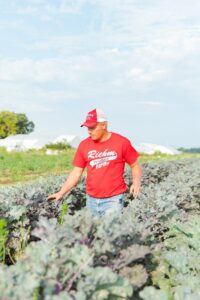
“I can tell you five years from now where we’re going to have our vegetable fields,” Phil said.
Crop rotations and placements are planned well in advance to avoid over-taxing soil nutrients and to decrease weed and disease pressure – and vegetable fields are moved each year.
Wind direction also plays a large role in the row direction of vegetables placement. “We want our vegetable beds to face east and west so the wind blows down through the rows helping with pollination and disease pressure” he said.
“One to two years before we go into the vegetable field, we’re growing a crop of alfalfa to put nitrogen and organic matter into the soil. At the same time this help to break up the soil to reduce compaction. The fall before the next spring crop – six months in advance – we broadcast cereal rye on previously laid beds where our vegetables are going to go.”
Rye is allelopathic, which means it emits natural toxins that inhibit the growth of other plants, and therefore, helps to prevent weed growth.
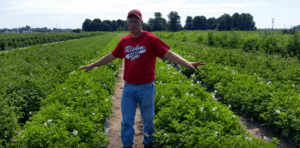
“It’s sustainable,” Phil says. “We do our best for the land because the land takes care of us.”
“It helps to cleanse the soil of disease while still allowing the good microorganisms to thrive and it also decreases the weed seed bank,” Phil said.
Some diseases that attack vegetables, such as powdery mildew on plants in the squash family, are airborne.
“We primarily get winds out of the southwest in Ohio,” he said. “Consequently, I don’t want air blowing spores toward a newer planting.” Fields are planned each year so wind blows towards older plantings not new plantings. Or even better towards another crop that is not affected by the same pest.
Humans who live a healthy lifestyle generally have fewer illnesses. In the same way, soil managed in a healthy way grows strong, healthy plants.
Phil said he spends a lot of time in the fields looking over the crops in spring, summer and fall.
“We’re constantly walking the crops,” he said.
Caring for the land
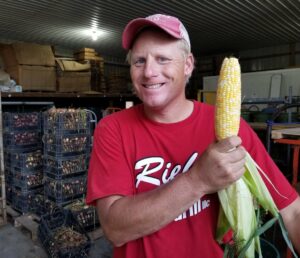
“We’re constantly keeping your palate interested,” Phil said. “You won’t get bored.”
Phil Riehm has been growing and selling vegetables since he was 8 years old.
“It’s been in my blood from the beginning,” he said.
He chose to advance his agricultural education at OSU as he grew older and learned from other growers for 10+ years before returning home in November 2014.
The Riehm family owns and leases 220 acres, and Phil manages the production of vegetables on a little more than 30 of those acres, including 10 Greenhouses/Cold Frames.
“Growing sweet corn and pumpkins takes about 11 acres on their own,” he said. “The rest of the vegetables grow on about 20 acres.”
In addition to sweet corn and pumpkins, the farm grows about 50 different crops – and within those crops there are 200-300 varieties.
For example, there are 15-20 varieties of tomatoes and 20-25 varieties of peppers, each harvested at the perfect time to offer customers peak nutrition and taste.
He often experiments with different varieties using a small numbers of plants.
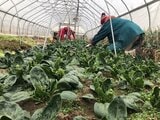
“We’re continuing to extend our season so we have more vegetables year-round,” Phil said.
“If we think it’s good, we put it right into production,” he said.
In addition to its vegetable fields, the farm uses 10 greenhouses.
He said spinach, lettuce, kale, other greens and herbs can handle temperatures well below freezing. “Actually, starches often turn to sugar, which makes them sweeter in the winter than at other times of the year,” he said.
Two greenhouses are used for starting plants that will be transplanted.
One greenhouse is kept colder for crops such as Brussels sprouts, cabbage, kale and others in the Brassica family, which like to germinate and grow at a cooler temperature. Another greenhouse is kept warmer for crops that like it warm such as tomato, peppers, eggplant and squash.
In the other greenhouses, raised beds are used in the soil with walkways between the rows. Some have “tunnels” inside where a blanket can be pulled over the top of temperature-sensitive plants in case of unseasonably cold weather.
Lots of planning and preparation is needed for operations to run smoothly.
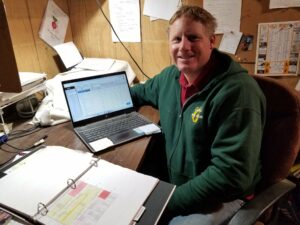
“On average, we have 200 beds of vegetables that are 600 feet long, and each one is mapped out based on a variety of factors,” Phil said.
Phil uses a computer software program that provides information such as how many feet of each crop will produce the needed amount of vegetables and how many seeds are needed to keep up with demand.
Years of inputting data also tells him when to seed or transplant and when he can expect to harvest.
“This helps us to be able to offer a consistent supply,” he said. “That way we don’t run out of a product or have too much.”
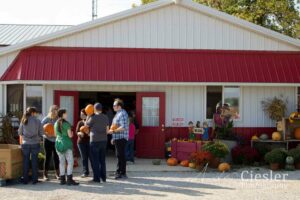
Riehm Produce Farm invites you to enjoy our CSA Market Boxes year-round.
The program also has mapping abilities and “knows” the length and width of each plot of land.
Fields are planned for harvest efficiency and crop families.
“It all ties together,” Phil said. “It’s all a circle. With healthy soil and healthy crops, you get a healthy you.”
